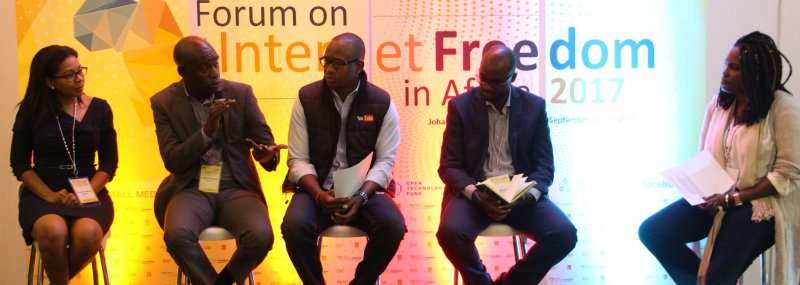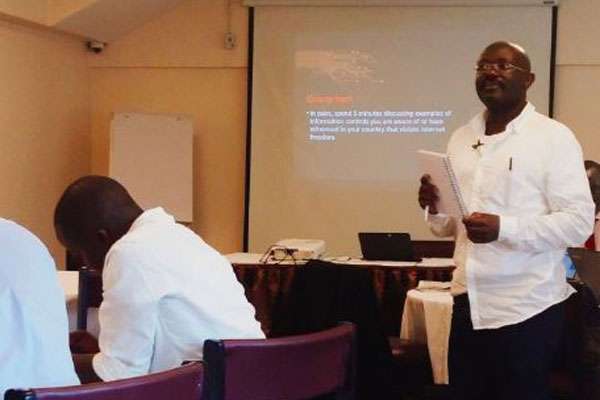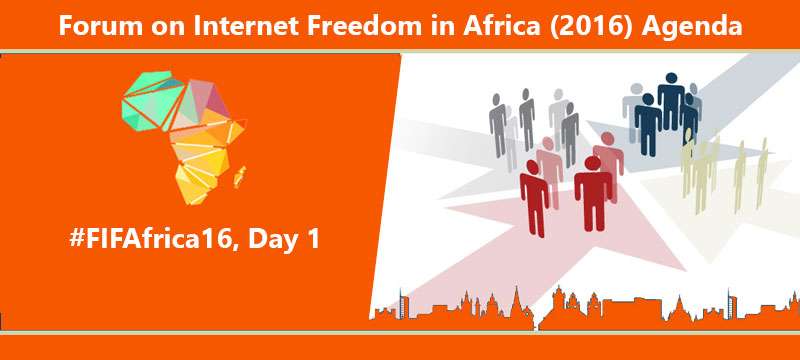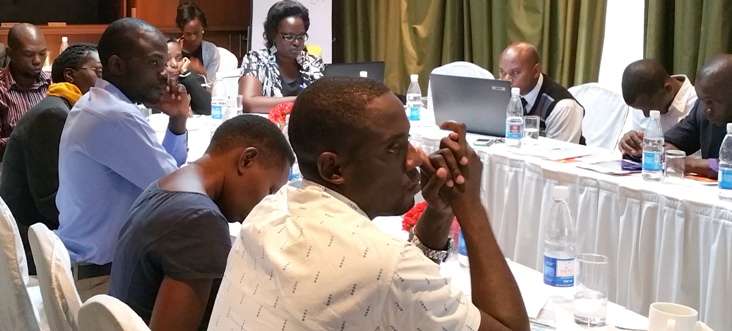Par Ababacar Diop |
Pour la première participation de Jonction au Forum sur la liberté de l’internet en Afrique (#FIFAfrica17) nous avons été ravi par la qualité de l’espace d’échange et de partage qui nous a été offert.
Organisé annuellement par the Collaboration on International ICT Policy for East and Soutier Arica (CIPESA) depuis 2014 à Kampala en Ouganda, et pour cette année 2017 en partenariat avec the Association for Progressive Communications (APC), à Johannesburg, le forum, s’est concentré sur plusieurs thématiques notamment la protection de la vie privée, l’accès à l’information, la libre expression, la non-discrimination et la libre circulation de l’information en ligne.
Des panélistes de haut niveau nous ont offert l’opportunité d’en apprendre davantage sur les enjeux et défis actuels de la société de l’information et de celui des droits numériques. Des interventions de qualités nous ont permis d’apprendre encore plus des expériences et des bonnes pratiques qui se développent en Afrique.
Nous témoignons, ce forum est un formidable espace de partage et d’échange d’expérience et de bonnes pratiques. Il permet en outre le renforcement des capacités des acteurs de la société de l’information et des défenseurs des droits numériques. La diversité linguistique en plus de la diversité géographique et de genre des participants constituent un vrai charme et une richesse intellectuelle du forum.
Nous avons appris à travers le forum que le réseautage est fondamental dans la défense des droits numériques. Les acteurs de la société de l’information ont besoin de collaborer et de travailler en synergie pour faire progresser les libertés sur internet, protéger davantage les données personnelles et le droit à la vie privée en ligne, faire face aux menaces qui pèsent sur la liberté d’expression sur internet partout en Afrique et lutter contre les coupures administratives d’internet pour des raisons politiques.
En effet, la présence de divers acteurs d’horizon divers a enrichi les panels et les discussions. Chacun exprimant ses préoccupations, ses expériences et ses objectifs pour une meilleure défense des droits et libertés sur internet. Tant les représentants de gouvernement que ceux de la société civile et du secteur privé chacun dans sa sphère d’activité s’est librement exprimé.
Nous avons également mesuré durant le forum toute l’importance de soutenir la recherche sur l’état de la liberté sur internet. En illustre le moment très fort lors du lancement du rapport annuel de recherche sur l’état de l’Internet en Afrique. Ce fut un intense moment de réflexion sur l’état de la liberté sur internet en Afrique. Ce rapport présentant l’état des lieux de la liberté sur internet en Afrique est si nécessaire pour les acteurs de la société civile africaine pour soutenir et documenter le plaidoyer et la sensibilisation.
Nous avons également appris que la réussite de tout forum repose sur le dynamisme et l’engagement des organisateurs. Nous félicitons ici les organisateurs et organisatrices qui n’ont ménagé aucun effort pour rendre agréable et studieux notre séjour. Toutes nos félicitations au comité d’organisation.
A la lumière de ce qui précède, nous lançons un appel à tous les bailleurs de renforcer leur soutien au Forum sur la liberté de l’internet en Afrique pour une plus grande participation des diverses régions de l’Afrique. La tenue annuelle du forum est d’une importance capitale pour les acteurs africain du Net. Un tel espace de rencontre, d’échange et de mise en réseau est nécessaire pour faire progresser le respect des droits numériques dans notre continent.
Nous lançons également un appel à tous les acteurs de travailler en synergie afin de mener la pression sur nos gouvernements pour le respect de la liberté d’expression sur internet et le respect du droit d’accès à l’information qui sont des piliers nécessaires à toute société démocratique qui aspire au développement économique, social et culturel. L’émergence de nos pays passe nécessairement par le respect des droits numériques.
L’Afrique a besoin de ce forum, l’Afrique doit soutenir le Forum sur la liberté de l’internet en Afrique.
Initialement publié sur le site de Jonction
Apply for the CIPESA-ICT4Democracy Fellowship Programme: Media
Fellowship Opportunity |
About the ICT4Democracy in East Africa network
The network works in Kenya, Tanzania, and Uganda to achieve two top-line objectives: 1) Increased citizen participation in governance and the realisation of human rights through ICT; and 2) Improved transparency and accountability of governments through ICT. Partners in the network are the Collaboration on International ICT Policy for East and Southern Africa (CIPESA), the Women of Uganda Network (WOUGNET), Transparency International Uganda, iHub Research (Kenya), the Kenya Human Rights Commission (KHRC), the Commission for Human Rights and Good Governance (CHRAGG, Tanzania) and Toro Development Network (ToroDev). Read more about the network here: www.ict4democracy.org.
Aim of the Fellowship Programme
The CIPESA-ICT4Democracy Fellowship (Media) aims to raise media understanding of, and its effective and consistent reporting of ICT-for-Democracy issues in East Africa. It is expected that the fellowships will result into increased quality and regularity of reporting, as well as a greater diversity of voices, in coverage related to ICT, democracy and human rights.
A total of 12 fellowships shall be issued each year starting May 2017. Applications will be accepted on a quarterly basis as per the below dates:
| Fellowship round | Application deadline |
| May – July | April 1st |
| August – October | July 1st |
| November – January | September 1st |
| February – April | January 1st |
Duration: The fellowship shall last for up to three months but can in some circumstances be shorter.
Outputs
Participants in the media fellowship programme will be expected to create various outputs, which may include print articles such as features, broadcast content, multimedia content (animations and infographics) and social media content, as will be agreed in advance of the start of the fellowship.
Eligibility
Applicants should be early career print, broadcast, online or multi-media journalists. Individuals passionate about media platforms such as bloggers and social media enthusiasts with relevant skills are also welcome to apply. Applicants must be based in Kenya, Uganda or Tanzania. It is preferred that applicants have experience in coverage of areas that are relevant to the work of ICT4Democracy in East Africa partners, which may include social accountability, gender and youth mainstreaming, technology, human rights and governance.
Compensation
The fellows shall be given a modest allowance to cater for expenses related to producing the outputs of their fellowship engagement.
Application process
To apply, email [email protected] with subject line stating Application for Media Fellowship. Submissions should include:
- Your CV
- A statement of interest that mentions the outputs you intend to produce from the fellowship, how they will be disseminated, and how these outputs are beneficial to the work of the ICT4Democracy network or its partner organisation(s), a suggestion of which partner organisation you wish to be attached to, the duration for which you wish to have the fellowship, and anticipated expenses. The statement of interest should not exceed 3 pages.
- Two samples of your work (written or other)
- Two reference letters.
Lobby Calls For Internet Freedom, Urges Responsible Use Of Social Media
By Lillian Mutavi |
Photo: The Collaboration on International Policy for East and Southern Africa (CIPESA) executive director Wairagala Wakabi makes his presentation on internet freedoms in Kenya on January 27, 2017. Lillian Mutavi | Daily Nation Media Group
This article was originally published in the Daily Nation
#FIFAfrica16: Agenda – Day 0 to Day 1

#FIFAfrica16 | See what we have lined up for the Forum on Internet Freedom in Africa 2016. On 27 September there will be a series of closed sessions by invite only while on 28 September the official launch of the Forum will take place.
CIPESA Convenes Journalists to Discuss Uganda’s Data Protection Bill
By Esther Nakkazi |
Ugandan citizens’ personal data may be at risk of misuse if the Uganda Data protection and Privacy Bill (2014) to be tabled before parliament is passed in current form. Currently, large entities like telecommunications service providers, insurers, hospitals and even schools retain the information of millions of citizens who remain unaware of how secure their information is, especially as more of it becomes digitised.
While Uganda called for comments to the Bill in late 2014, little progress was made on it over the course of 2015. According to Gloria Katuuku from the Ministry of ICT, the comments received have been incorporated into a revision of the bill. “We brought this Bill before the public so that we get conclusive remarks. The bill has been gazetted and will be tabled in parliament, meaning at this time we shall just compile the concerns,” said Katuuku. She was speaking at a workshop convened by the Collaboration on International ICT Policy for East and Southern Africa (CIPESA) where Ugandan parliamentary journalists discussed data protection and privacy with reference to the bill.

The workshop was organised in conjunction
with the Uganda Parliamentary Press Association (UPPA) and aimed to create awareness among parliament journalists about clauses in the proposed law that contravene citizens’ rights, including to privacy. Few journalists were aware that government had drafted the law and called for robust media engagement with Members of Parliament so as to generate debate on data protection and privacy issues.
The former Chairman of parliament’s ICT Committee, Edward Baliddawa, said the data protection law should have been the basis for other cyber laws in Uganda. He added that as the country edges towards e-commerce, such as business process outsourcing, there is a need to regulate data controllers.
“This Bill is good for our safety and privacy as individuals and to become an e-commerce country,” he said. However,he also called for continuous engagement with all stakeholders across the lifespan of the bill – drafting, tabling to parliament and any eventual amendments.
Although existing laws such the Electronic Signatures Act, 2011, the Computer Misuse Act, 2011, the Regulation of Interception of Communications Act 2010 and the Communications Commission Act 2013 cover aspects of data protection and privacy, they contain contradictions and potentially expose users’ information to unwarranted access and misuse by authorities. Lillian Nalwoga, CIPESA’s Policy Officer, said of the laws: “These laws have broad terminologies that should be amended to repeal contradictory provisions and this can be done within the Data protection and Privacy Bill, 2014 in the contexts of data users and collectors, and to prevent abuse.”
See this Overview of How ICT Policies Infringe on Online Privacy and Data Protection in Uganda
But the proposed data protection and privacy law that is meant to address privacy of citizens’ communications and data still has ambiguous terminologies, unclear definitions and arbitration issues that will negate its purpose.
According to CIPESA officials, the drafting phrase should further engage with and seek consultations with different stakeholders including civil society, private sector, the media and academia for an extended period prior to tabling it before parliament. This would ensure that the law passed “is inclusive, accommodative and addresses the concerns raised by all the stockholders,” said Wakabi Wairagala, the head of CIPESA.
At the workshop, CIPESA officials referred journalists to various areas of concern in the draft bill including some of its ambiguous terminologies, such as Section 4 (2) which states that personal data may be collected or processed where necessary for ’national security’ or for the ‘proper performance’ of a public duty’ by a public body. However, these words can be misinterpreted and leave room for the access to and abuse of citizens’ information.
Meanwhile, Section 7 (2) says data can be collected from another person, source or public body in certain circumstances without the consent of the owner. The length of time that the collected personal data can be retained is also not indicated. Section 14 (1) states that the data cannot be held for a period longer than is necessary and says it will be retained for national security purposes.
Overall, the bill does not explicitly state what constitutes a ‘privacy infringement’, thereby leaving users’ data open to abuse by data collectors and processors. It also does not state the procedures for citizens to access their data.
See CIPESA’s review of the Bill: Reflections on the Draft Data Protection and Privacy Bill





